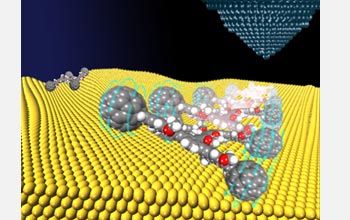Home > Press > "Fantastic Voyage" Not So Far-fetched: Studies yield clues to powering nano-sized machines
 |
| Single-molecule nano-vehicles synthesized by researchers at Rice University in Texas measure just 4x3 nanometers and have four carbon-based buckyball wheels connected to four independently rotating axles and an organic chemical chassis.
Credit: T. Sasaki/Rice University |
Abstract:
A new paper published in the May 2009 issue of the oldest continuously published magazine in the United States, Scientific American, asks readers to imagine producing vehicles so small they would be about the size of a molecule and powered by engines that run on sugar. To top it off, a penny would buy a million of them.
"Fantastic Voyage" Not So Far-fetched: Studies yield clues to powering nano-sized machines
Arlington, VA | Posted on April 23rd, 2009The concept is nearly unthinkable, but it's exactly the kind of thing occupying National Science Foundation supported researchers at Penn State and Rice universities.
For several years, Ayusman Sen, who heads Penn State's department of chemistry, and his colleague Thomas E. Mallouk, director of the Center for Nanoscale Science at Penn State, have investigated technologies that could realize these remarkable machines whose uses might include delivering medicine to specific tissue, accomplishing surgeries or communicating with the outside world from inside the human body.
Though researchers consistently have improved ways to build nano-machines, the stumbling block has been finding a way to power them. Shrinking energy producers--internal combustion engines, electric motors or jet engines--below millimeter dimensions is not an easy task, but researchers may be closer to a fantastic solution.
In the 1966 movie Fantastic Voyage, scientists shrink a submarine to microscopic size and inject it into the blood stream of a brilliant scientist, who has a blood clot forming in his brain. The nano-sized surgeons then set out to remove the blood clot.
Today, researchers can steer nano-machines, use them to convey cargo, and guide them using electromagnetic forces or chemical interactions. All of this, they say, makes the world seen in Fantastic Voyage not so far-fetched.
####
About National Science Foundation
The National Science Foundation (NSF) is an independent federal agency that supports fundamental research and education across all fields of science and engineering. In fiscal year (FY) 2009, its budget is $9.5 billion, which includes $3.0 billion provided through the American Recovery and Reinvestment Act. NSF funds reach all 50 states through grants to over 1,900 universities and institutions. Each year, NSF receives about 44,400 competitive requests for funding, and makes over 11,500 new funding awards. NSF also awards over $400 million in professional and service contracts yearly.
For more information, please click here
Contacts:
Media Contacts
Bobbie Mixon
NSF
(703) 292-8070
Program Contacts
Thomas P. Rieker
NSF
(703) 292-4914
Principal Investigators
Thomas E. Mallouk
Penn State University
(814) 863-9637
Copyright © National Science Foundation
If you have a comment, please Contact us.Issuers of news releases, not 7th Wave, Inc. or Nanotechnology Now, are solely responsible for the accuracy of the content.
| Related News Press |
News and information
![]() Decoding hydrogen‑bond network of electrolyte for cryogenic durable aqueous zinc‑ion batteries January 30th, 2026
Decoding hydrogen‑bond network of electrolyte for cryogenic durable aqueous zinc‑ion batteries January 30th, 2026
![]() COF scaffold membrane with gate‑lane nanostructure for efficient Li+/Mg2+ separation January 30th, 2026
COF scaffold membrane with gate‑lane nanostructure for efficient Li+/Mg2+ separation January 30th, 2026
Possible Futures
![]() Decoding hydrogen‑bond network of electrolyte for cryogenic durable aqueous zinc‑ion batteries January 30th, 2026
Decoding hydrogen‑bond network of electrolyte for cryogenic durable aqueous zinc‑ion batteries January 30th, 2026
![]() COF scaffold membrane with gate‑lane nanostructure for efficient Li+/Mg2+ separation January 30th, 2026
COF scaffold membrane with gate‑lane nanostructure for efficient Li+/Mg2+ separation January 30th, 2026
Nanomedicine
![]() New molecular technology targets tumors and simultaneously silences two ‘undruggable’ cancer genes August 8th, 2025
New molecular technology targets tumors and simultaneously silences two ‘undruggable’ cancer genes August 8th, 2025
![]() New imaging approach transforms study of bacterial biofilms August 8th, 2025
New imaging approach transforms study of bacterial biofilms August 8th, 2025
![]() Cambridge chemists discover simple way to build bigger molecules – one carbon at a time June 6th, 2025
Cambridge chemists discover simple way to build bigger molecules – one carbon at a time June 6th, 2025
![]() Electrifying results shed light on graphene foam as a potential material for lab grown cartilage June 6th, 2025
Electrifying results shed light on graphene foam as a potential material for lab grown cartilage June 6th, 2025
Announcements
![]() Decoding hydrogen‑bond network of electrolyte for cryogenic durable aqueous zinc‑ion batteries January 30th, 2026
Decoding hydrogen‑bond network of electrolyte for cryogenic durable aqueous zinc‑ion batteries January 30th, 2026
![]() COF scaffold membrane with gate‑lane nanostructure for efficient Li+/Mg2+ separation January 30th, 2026
COF scaffold membrane with gate‑lane nanostructure for efficient Li+/Mg2+ separation January 30th, 2026
Interviews/Book Reviews/Essays/Reports/Podcasts/Journals/White papers/Posters
![]() Metasurfaces smooth light to boost magnetic sensing precision January 30th, 2026
Metasurfaces smooth light to boost magnetic sensing precision January 30th, 2026
![]() COF scaffold membrane with gate‑lane nanostructure for efficient Li+/Mg2+ separation January 30th, 2026
COF scaffold membrane with gate‑lane nanostructure for efficient Li+/Mg2+ separation January 30th, 2026
|
|
||
|
|
||
| The latest news from around the world, FREE | ||
|
|
||
|
|
||
| Premium Products | ||
|
|
||
|
Only the news you want to read!
Learn More |
||
|
|
||
|
Full-service, expert consulting
Learn More |
||
|
|
||








